Global Heating, Plastics, Pollution, and Overfishing Threaten Marine Life
Scientists warned that a failure to curb carbon emissions may result in the extinction of most marine life, an emptying of the ocean last seen 250 million years ago amid a rapidly warming climate.
Accelerating greenhouse gas emissions could “culminate in a mass extinction rivaling those of Earth’s ancient past,” stated a peer-reviewed paper published Thursday in the journal Science. The reports also concluded that rising GHG emissions may cause a catastrophe, limiting temperature rise to 2° Celsius would reduce the risk by more than 70%, according to a study in the journal Science.
The oceans already have absorbed a third of global carbon emissions and 90 percent of the excess heat created by humans.
The vast expanse and forbidding ocean depths have until recently limited scientists to only a fundamental understanding of climate changes now underway impacting the earth’s marine ecosystems. Science, however, continues to expand the cause and effect understanding of human impacts on the planet and a greater understanding of what these changes represent to the marine creatures which call our oceans home, and also represent a significant food supply for humankind.
Not since an asteroid wiped out the dinosaurs has marine life been at such risk of extinction
The world has already warmed more than 1 degree Celsius (1.8 degrees Fahrenheit) since the preindustrial era, and last year the oceans contained more heat energy than at any point since record-keeping began six decades ago.
In a 2018 Princeton University study found, based on climate models which simulate the nearest example to today’s planetary warming, a future world similar to the late Permian Period of 250 million years ago when volcanic eruptions released huge quantities of greenhouse gases into the atmosphere.
They found ocean surface temperatures increased by more than 10° C, triggering a nearly 80% decline in marine oxygen levels. An examination of the fossil record confirmed that oxygen-depleted warming seas killed off up to 96% of marine species.
The Permian Extinction Period — a roadmap of today’s warming oceans
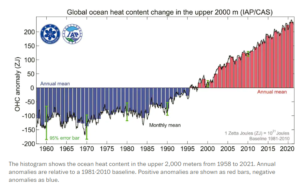 Today, ocean temperatures are rising to record highs, and correspondingly, oxygen levels are falling. “The same mechanism that would be driving species losses from human-induced climate change has been shown to have caused extinction in the geologic past,” a recent Princeton study determined.
Today, ocean temperatures are rising to record highs, and correspondingly, oxygen levels are falling. “The same mechanism that would be driving species losses from human-induced climate change has been shown to have caused extinction in the geologic past,” a recent Princeton study determined.
Many species are slowly suffocating as oxygen leaches out of the seas.
Even populations that have managed to withstand the ravages of overfishing, pollution and habitat loss are struggling to survive amid accelerating global heating from climate change.
If humanity’s greenhouse gas emissions continue to increase, roughly a third of all marine animals could vanish…
Using climate models that predict the behavior of species based on simulated organism types, The study further found that the number of local marine disappearances of particular species, increases about 10 percent with every 1 degree Celsius of warming.
The researchers tested their models by using them to simulate a mass extinction at the end of the Permian period, when catastrophic warming triggered by volcanic eruptions wiped out roughly 90 percent of all life on Earth. Because the models successfully replicated the events of 250 million years ago, the scientists were confident in their predictions for what might happen in the foreseeable future.
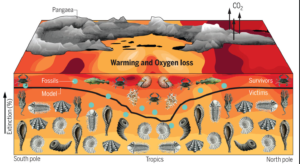 The Princeton University research revealed that most animals can’t afford to lose much more than 50 percent of their habitat — beyond that number, a species tips into irreversible decline. In the worst-case emissions scenarios, the losses would be on par with the five worst mass extinctions in Earth’s history.
The Princeton University research revealed that most animals can’t afford to lose much more than 50 percent of their habitat — beyond that number, a species tips into irreversible decline. In the worst-case emissions scenarios, the losses would be on par with the five worst mass extinctions in Earth’s history.
Cooking creatures literally within their habitat
These rising ocean temperatures are shifting the boundaries of marine creatures’ comfort zones. Many are fleeing northward in search of cooler waters, causing “extirpation” — or local disappearance — of once-common species.
The danger of warming is compounded by the fact that hotter waters start to lose dissolved oxygen — even though higher temperatures speed up the metabolisms of many marine organisms, so that they need more oxygen to live.
The ocean contains just one-sixtieth as much oxygen as the atmosphere, even less in warmer areas where water molecules are less able to keep the precious oxygen from bubbling back into the air. As global temperatures increase, that reservoir declines even further.
The heating of the sea surface also causes the ocean to stratify into distinct layers, making it harder for warmer, oxygenated waters above to mix with the cooler depths.
Deoxygenation poses one of the greatest climate threats to marine life. Scientists have documented expanding “shadow zones” where oxygen levels are so low that most life can’t survive.
This climate-driven marine die-off is just one piece of a broader biodiversity crisis gripping the entire globe.
A recent report from the Intergovernmental Panel on Climate Change found that warming has contributed to the disappearance of at least 400 species in the world’s oceans.
The scientist found that if global temperatures increase around 4.9° C by the end of the century and continue to rise, it would trigger mass extinction on par with the end of the Permian Period.
Under a low-emissions scenario that keeps temperature rise to 2° C, scientists project that extinction rates would range from about 4% – the natural rate – to 10%. “That’s still an awful lot of species in absolute numbers,” said Penn, noting that even absent climate change, the researchers estimated that 10% to 15% of species are at risk of extinction from the industrialization of the ocean and other human-caused threats.
Depleting global fish Stocks
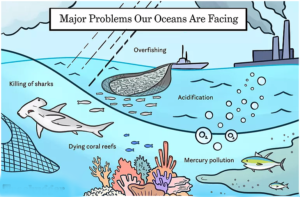
“One big potential, and likely, impact will be the loss of ecosystem function in some marine ecosystems, and ecosystem cascading effects, even with only a small proportion of species lost,” said Butt, who studies the consequences of climate change on biodiversity and was not involved in the research.
For instance, the loss of a prey species could lead to declines in predators that regulate the health of marine ecosystems on which humans depend for food.
The paper noted that the regions of the ocean most vulnerable to climate-driven extinction are low-oxygen areas home to some of the world’s most productive fisheries.
“The projected impact of accelerating climate change on marine biota is profound, driving extinction risk higher and marine biological richness lower than has been seen in Earth’s history for the past tens of millions of years,” it concluded.
The Ocean is not a garbage dump or is it?
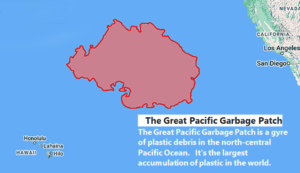 At least 14 million tons of plastic end up in the ocean every year, and plastic makes up 80% of all marine debris found from surface waters to deep-sea sediments. Marine species ingest or are entangled by plastic debris, which causes severe injuries and death, and people in turn eat the fish contaminated by oceans laden plastics.
At least 14 million tons of plastic end up in the ocean every year, and plastic makes up 80% of all marine debris found from surface waters to deep-sea sediments. Marine species ingest or are entangled by plastic debris, which causes severe injuries and death, and people in turn eat the fish contaminated by oceans laden plastics.
An estimated 8 Million tons of plastic enters our oceans every year. There are 5.25 trillion pieces of plastic waste estimated to be in our oceans. 269,000 tons float, 4 billion microfibers per km² dwell below the surface. 70% of our debris sinks into the ocean’s ecosystem, 15% floats, and 15% lands on our beaches.
Fish in the North Pacific ingest 12,000 to 24,000 tons of plastic each year, which can cause intestinal injury and death and transfers plastic up the food chain to bigger fish, marine mammals and human seafood eaters.
A separate U.N. panel has found that about 1 million additional species are at risk of extinction as a result of overexploitation, habitat destruction, pollution and other human disruption of the natural world.
In an analysis for the publication Science that accompanied Princeton report, Rutgers ecologist Alexa Fredston compared marine animals to canaries in a coal mine, alerting humanity to invisible forces — such as dangerous carbon dioxide accumulation and ocean oxygen loss — that also threaten our ability to survive.
Fredston summed things this way, “If people can take action to preserve ocean wildlife, we will wind up saving ourselves.”

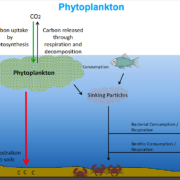


Amen to all that!